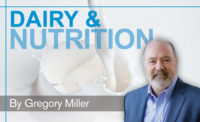
The Health Professional Connection
by Ann Marie Krautheim
Health professionals are a key information resource for their patients, making them an important ally in providing the facts on milk safety and quality to consumers.
Recent producer-funded consumer research further
demonstrates the important role of health professionals, as consumers
identified doctors and dietitians as the single most trustworthy source
regarding product information.
With this in mind, the National Dairy Council® (NDC) has
made it a priority to inform health professionals with scientific research
and nutrition information related to all dairy foods — whether
choosing conventional, organic, lactose-free or lower-fat products.
Educating health professionals about milk is a top
priority due to the heightened public focus on agricultural practices and
increased interest in organic foods. And as demand for organic products
continues to grow, so does the potential for misconceptions regarding the
safety and nutritional value of milk products.
For example, while the U.S. Department of Agriculture
makes no claims that organically produced food is safer or more nutritious
than conventionally produced foods, more than 80 percent of consumers who
purchase organic products do so primarily for its nutritional value,
according to Shopping for Health 2005, a report by the Food Marketing
Institute and Prevention magazine. Additionally, in a 2005 survey
conducted by the NDC, 19 percent of health professionals agree that they
should recommend organic milk.
NDC works to educate health professionals that both
organic and conventional milk are safe and nutritious ways to help
Americans get their recommended three servings of dairy foods a day.
Ongoing efforts position organic milk as one of a
variety of choices in the dairy case. NDC works with members of the 3-A-Day™ of Dairy
Advisory Panel, which includes representatives from the American Academy of
Family Physicians (AAFP), American Academy of Pediatrics (AAP), American
Dietetic Association (ADA) and the National Medical Association (NMA), to
develop educational tools, submit articles and continue research
initiatives related to milk safety and nutrition. NDC also conducts
educational and communication training sessions for leading health
professionals.
In addition, NDC and local, state and regional offices
submit information about the difference between organic and regular milk.
Communications efforts also provide information about
the key nutrients dairy offers. This includes calcium, protein and vitamin
D, which were identified as key nutrients of concern in the 2005 Dietary
Guidelines for Americans (DGA). The DGA also recognized that people who
consume more dairy foods have better overall diets, consume more nutrients
and see improved bone health.
With Americans today consuming roughly half of the
government recommendations, organic and conventional dairy products offer
another option to achieve three servings a day.
For additional information on the health benefits of
dairy foods, visit www.nationaldairycouncil.org
Ann Marie Krautheim, M.A., R.D., is senior vice
president of nutrition affairs for the National Dairy Council.
$OMN_arttitle="The Health Professional Connection";?>
$OMN_artauthor="Ann Marie Krautheim";?>
